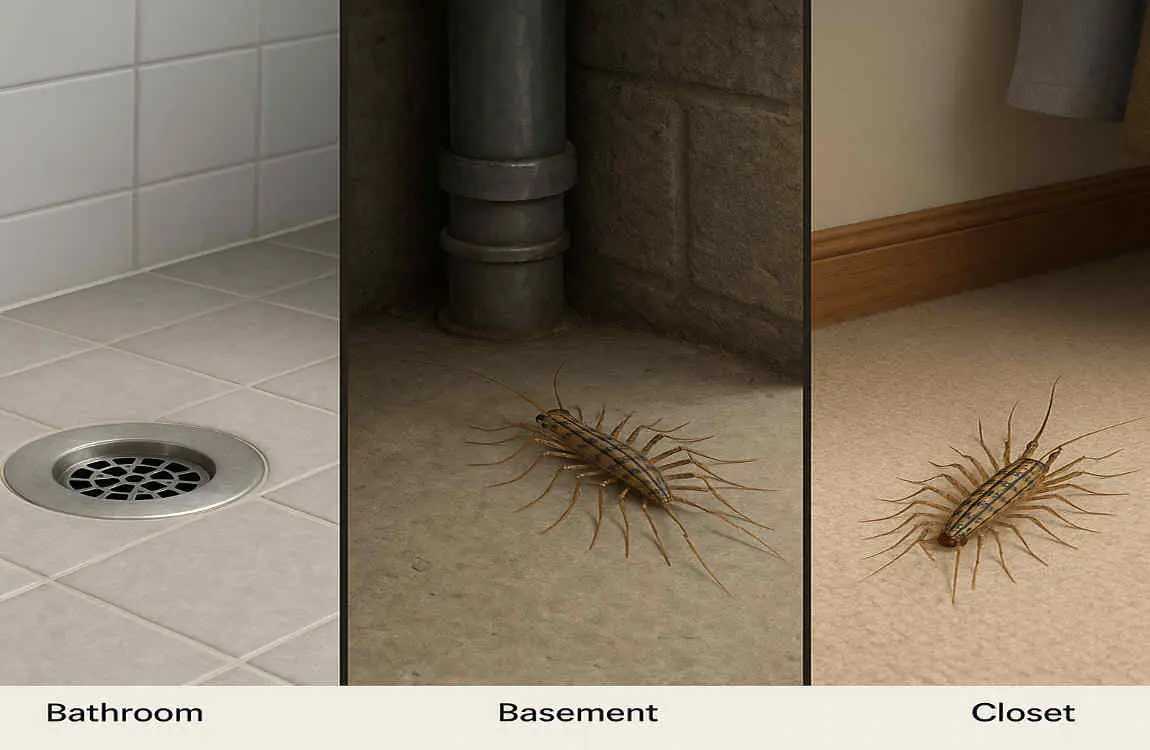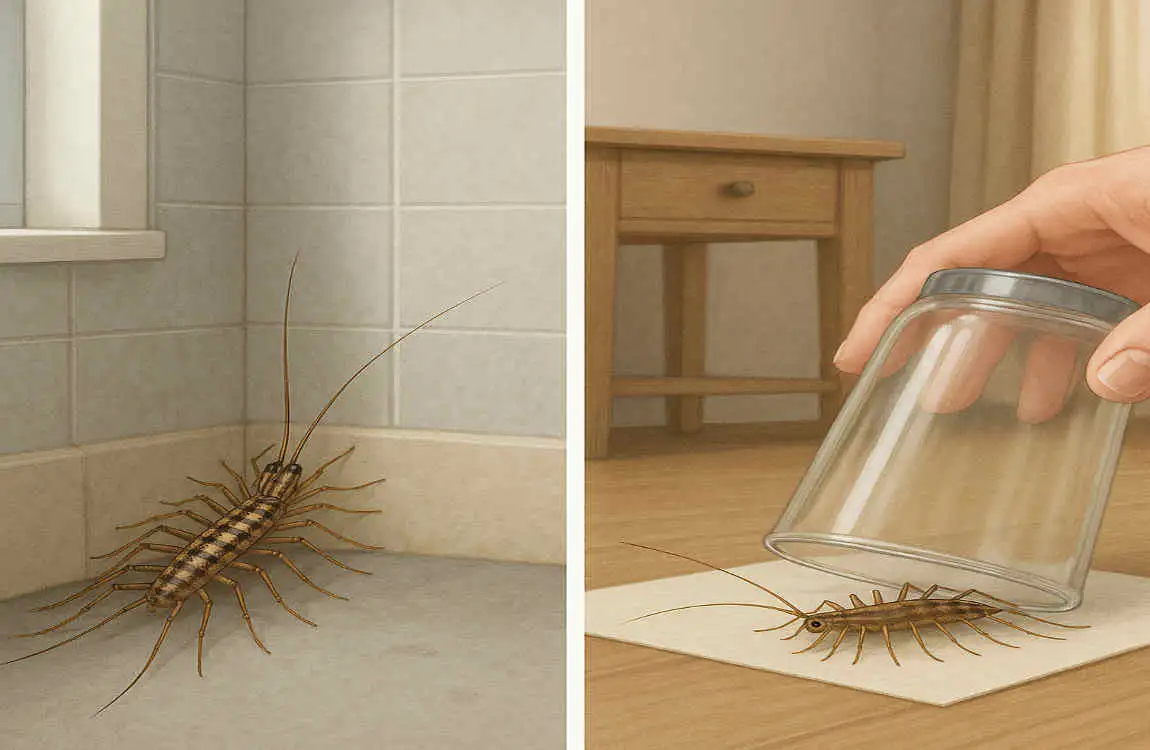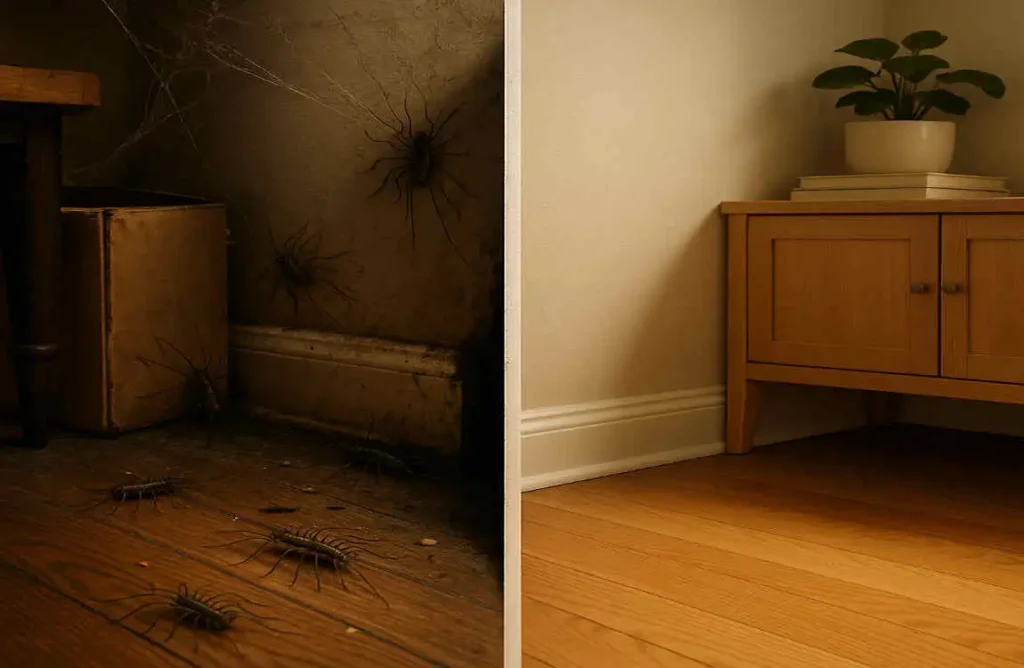Hey there, friend! Let’s discuss the creepy crawlies that sometimes invade our homes: house centipedes. You might have seen these long-legged critters scurrying across your floor or hiding in dark corners. But are house centipedes dangerous? That’s the big question we’ll dive into today.
We’ll cover what these pests look like, where they like to hang out, and whether or not they pose a real threat to you and your family. Plus, we’ll share some practical tips on how to clean home effectively to prevent house centipedes from taking up residence.
What Are House Centipedes?

Appearance and Size
Let’s start with the basics. House centipedes (Scutigera coleoptrata) are those multi-legged critters that can send shivers down your spine. They typically have 15 pairs of long, thin legs that give them a look reminiscent of a sci-fi movie. The front pair of legs is longer than the others and is used to catch prey.
In terms of size, these pests typically measure between 1 and 1.5 inches in length, with some larger specimens reaching up to 3 inches in length. Their bodies are elongated and flattened, with a distinct head and a series of body segments.
Behaviour and Habitat
House centipedes are known for their speed and agility. They can move quickly across surfaces, making them hard to catch. These pests are nocturnal, so you’re more likely to spot them at night when they’re out hunting for food.
Inside your home, house centipedes tend to gravitate towards dark, damp areas. Bathrooms, basements, and closets are some of their favourite hangout spots. They’re also drawn to places with high humidity and plenty of hiding spots, like under sinks or behind baseboards.
Life Cycle and Reproduction
House centipedes have a relatively short life cycle. They typically live for about 3 to 7 years, depending on environmental conditions. Females lay their eggs in hidden, moist locations, and the eggs hatch into tiny, worm-like larvae.
As the larvae grow, they undergo several moults, adding more body segments and legs with each stage. It takes about 3 years for a house centipede to reach full maturity.
Why They Enter Homes
So, why do these critters invade our living spaces in the first place? Well, house centipedes are attracted to homes for a few key reasons:
- Food source: These pests feed on other insects, so if your home has a bug problem, it’s like a buffet for house centipedes.
- Moisture: As we mentioned earlier, house centipedes love damp environments. Leaky pipes, high humidity, and standing water are all invitations for these pests to move in.
- Shelter: Your home provides a cosy, protected space for house centipedes to hide and reproduce.
Now that we have a better understanding of what house centipedes are and why they enter our homes, let’s address the big question on everyone’s mind: Are house centipedes dangerous?
Are House Centipedes Dangerous?
Venom and Bite Potential
Let’s get straight to the point: house centipedes do have venom, but it’s not usually harmful to humans. They use their venom to paralyse and kill their prey, which primarily consists of other insects and spiders.
House centipedes can bite if they feel threatened, but their mouthparts are small and not designed to penetrate human skin easily. If a bite does occur, it’s usually more of a nuisance than a serious health concern.
Harm to Humans
So, are house centipede bites harmful to humans? In most cases, no. The venom from a house centipede bite is not potent enough to cause significant harm to healthy adults.
However, some people may experience mild symptoms, such as:
- Redness and swelling at the bite site
- Itching or mild pain
- A small, localised reaction similar to a mosquito bite
In rare cases, individuals with severe allergies may experience more intense symptoms, such as difficulty breathing or anaphylaxis. If you have a known allergy to insect bites or stings, it’s best to seek medical attention if a house centipede bites you.
Myths vs. Facts
There are numerous myths and misconceptions surrounding house centipedes. Let’s set the record straight:
- Myth: House centipedes are deadly to humans.
- Fact: House centipede venom is not potent enough to cause serious harm to humans.
- Myth: House centipedes carry diseases.
- Fact: There is no evidence to suggest that house centipedes transmit diseases to humans.
- Myth: House centipedes are aggressive and will attack humans.
- Fact: House centipedes are generally shy and will only bite if they feel threatened.
Impact on Pets
What about our furry friends? Are house centipedes dangerous to pets? In most cases, the answer is no. House centipedes are not considered a significant threat to dogs, cats, or other household pets.
However, if your pet ingests a house centipede, they may experience mild gastrointestinal upset, such as vomiting or diarrhoea. If you notice any unusual symptoms after your pet encounters a house centipede, it’s always a good idea to consult with your veterinarian.
Why Cleanliness Helps Prevent House Centipedes
Clutter and Dirt: A Centipede’s Paradise
Now that we’ve established that house centipedes are not usually dangerous to humans, let’s talk about how to keep them out of your home. The key? Cleanliness.
House centipedes thrive in cluttered, dirty environments. Piles of laundry, stacks of newspapers, and neglected corners provide the perfect hiding spots for these pests. By keeping your home clean and tidy, you’re removing potential habitats for house centipedes.
The Role of Moisture and Damp Areas
As we mentioned earlier, house centipedes are attracted to moisture. Leaky faucets, damp basements, and high humidity create an ideal environment for these pests to flourish.
By addressing moisture issues in your home, you can make it less appealing to house centipedes. Fix any leaks, use a dehumidifier in damp areas, and ensure proper ventilation to reduce humidity levels.
Removing Insects: Cutting Off the Food Supply
House centipedes feed on other insects, so if your home has a bug problem, it’s like a buffet for these pests. By keeping your home clean and free of other insects, you’re cutting off the food supply for house centipedes.
Regular cleaning, vacuuming, and dusting can help remove insects and their eggs from your home. Pay special attention to areas where insects are commonly found, such as kitchens, bathrooms, and basements.
Tips for Reducing Humidity and Moisture Buildup
Here are some practical tips for reducing humidity and moisture buildup in your home:
- Use a dehumidifier in areas prone to dampness, such as basements and bathrooms.
- Ensure proper ventilation in bathrooms and kitchens by using exhaust fans.
- Fix any leaky pipes or faucets promptly.
- Use a hygrometer to monitor humidity levels in your home and take action if they’re too high.
- Avoid overwatering indoor plants, as excess moisture can contribute to high humidity levels.
By following these tips and maintaining a clean, dry home, you’ll be well on your way to preventing house centipedes from taking up residence.
Effective Cleaning Practices to Keep House Centipedes Away
Decluttering Strategies
Let’s dive into some specific house cleaning practices that can help keep house centipedes at bay. First up: decluttering.
House centipedes love to hide in cluttered areas, so by minimising hiding spots, you’re making your home less appealing to these pests. Here are some decluttering strategies to try:
- Regularly sort through and donate or discard items you no longer need.
- Keep surfaces clear of clutter and store items in closed containers.
- Tackle one area at a time, such as a closet or a drawer, to make the process more manageable.
Vacuuming and Dusting Techniques
Vacuuming and dusting are essential for removing insects and their eggs from your home. Here are some tips for effective vacuuming and dusting:
- Vacuum all floors, including hard surfaces and carpets, at least once a week.
- Use the crevice tool to get into tight spaces and corners where insects may hide.
- Dust all surfaces regularly, including baseboards, window sills, and furniture.
- Use a microfiber cloth or a dusting wand to trap dust and allergens.
Deep Cleaning Bathrooms, Basements, and Other Common Centipede Areas
House centipedes are often found in bathrooms, basements, and other damp areas. Here’s how to deep clean these spaces:
- Scrub and disinfect all surfaces, including sinks, toilets, and showers.
- Use a mildew remover to tackle any mould or mildew growth.
- Vacuum and mop floors thoroughly, paying special attention to corners and baseboards.
- Inspect and repair any leaks or moisture issues in these areas.
Sealing Cracks and Gaps
House centipedes can squeeze through tiny cracks and gaps in your home’s structure. By sealing these entry points, you can help keep them out. Here’s how:
- Inspect your home’s exterior and interior for cracks and gaps.
- Use caulk or weatherstripping to seal gaps around doors, windows, and baseboards.
- Repair any damaged screens on windows and doors.
Proper Waste Disposal and Sanitation
Proper waste disposal and sanitation are crucial for preventing house centipedes and other pests. Here are some tips:
- Take out the trash regularly and use a sealed trash can.
- Clean up any food spills or crumbs immediately.
- Store food in sealed containers to prevent attracting insects.
- Regularly clean and sanitise garbage cans and recycling bins to maintain hygiene.
By incorporating these cleaning practices into your routine, you’ll be well on your way to keeping house centipedes out of your home.
Additional Preventive Measures Beyond Cleaning
While cleaning is essential for preventing house centipedes clean, there are some additional measures you can take to keep these pests at bay.
Dehumidifiers and Ventilation Improvements
As we mentioned earlier, house centipedes are attracted to moisture. By using a dehumidifier and improving ventilation in your home, you can make it less appealing to these pests.
- Use a dehumidifier in areas prone to dampness, such as basements and bathrooms.
- Ensure proper ventilation in bathrooms and kitchens by using exhaust fans.
- Open windows and doors when the weather permits to improve air circulation.
Safe Pest Control Options
If you’re dealing with a persistent house centipede problem, consider using safe pest control options. Here are some natural repellents and insecticides to try:
- Diatomaceous earth: This powdery substance can be sprinkled in areas where house centipedes are commonly found. It works by dehydrating the pests.
- Essential oils: Certain essential oils, such as peppermint and tea tree oil, can act as natural repellents for house centipedes.
- Insecticidal soap: This can be used to target house centipedes directly. Be sure to follow the manufacturer’s instructions carefully.
Professional Pest Control Services
If you’ve tried everything and you’re still dealing with a house centipede infestation, it may be time to call in the professionals. Pest control experts possess the knowledge and tools necessary to eliminate house centipedes and prevent future infestations effectively.
Here are some signs that it’s time to call a professional:
- You’ve seen a large number of house centipedes in your home.
- You’ve tried DIY methods and they haven’t worked.
- You have a persistent moisture problem in your home that’s attracting house centipedes.
Installing Screens on Windows and Doors
A straightforward way to prevent house centipedes from entering your home is to install screens on windows and doors. This creates a barrier that keeps pests out while still allowing fresh air to circulate.
- Inspect your existing screens for any tears or holes and repair them as needed.
- Install new screens on windows and doors that don’t have them.
- Keep screens closed when windows and doors are open to prevent house centipedes from sneaking in.
By combining these additional preventative measures with regular cleaning, you’ll be well-equipped to keep house centipedes out of your home.
What to Do If You Find House Centipedes in Your Home

So, you’ve spotted a house centipede in your home. What should you do? Don’t panic! Here’s a step-by-step guide for safely removing or trapping these pests.
Safely Removing or Trapping House Centipedes
If you come across a house centipede, you can try to remove it yourself using these methods:
- Use a vacuum cleaner: Vacuum up the house centipede and dispose of it outside.
- Trap it with a jar: Place a jar over the house centipede and slide a piece of paper underneath to trap it. Then, release it outside.
- Use sticky traps: Place them in areas where house centipedes are commonly found. These traps can help catch and remove the pests.
When to Seek Professional Help
If you’ve tried removing house centipedes yourself and they keep coming back, it may be time to seek professional help. Pest control experts can identify the source of the infestation and implement effective treatment and prevention strategies to address the issue.
Here are some signs that it’s time to call a professional:
- You’ve seen a large number of house centipedes in your home.
- You’ve tried DIY methods and they haven’t worked.
- You have a persistent moisture problem in your home that’s attracting house centipedes.
Monitoring and Follow-Up Prevention
After you’ve removed house centipedes from your home, it’s essential to monitor the situation and take steps to prevent future infestations. Here’s what you can do:
- Regularly inspect your home for signs of house centipedes, such as shed skins or live pests.
- Continue to practice good cleaning habits, including decluttering, vacuuming, and dusting.
- Address any moisture issues in your home, such as leaky pipes or high humidity.
- Consider using preventive measures, such as dehumidifiers, natural repellents, and screens on windows and doors, to help protect your home from pests.
By following these steps and staying vigilant, you can keep house centipedes out of your home for good.
Benefits of a Clean Home Beyond Pest Control
While keeping your home clean is essential for preventing house centipedes, there are many other benefits to maintaining a tidy living space. Let’s explore some of the ways a clean home can improve your life.
Health Benefits
A clean home can have a significant impact on your health and well-being. Here are some of the benefits:
- Reduced allergens: Regular cleaning can help remove dust, pollen, and other allergens from your home, reducing the risk of allergic reactions and respiratory issues.
- Fewer germs: Cleaning and disinfecting surfaces can help kill germs and bacteria, reducing the spread of illness.
- Improved mental health: A clean, organised home can help reduce stress and anxiety, promoting a sense of calm and overall well-being.
Enhanced Home Comfort and Aesthetics
A clean home is not only healthier, but it’s also more comfortable and aesthetically pleasing. Here’s how:
- Increased comfort: A clutter-free home with clean surfaces and floors is more inviting and comfortable to live in.
- Improved aesthetics: Regular cleaning and maintenance can help keep your home looking its best, from sparkling windows to spotless countertops.
- Better air quality: Cleaning can help remove dust and other pollutants from the air, thereby improving overall air quality and making your home a more pleasant place to be.
Protection of Property and Belongings
A clean home can also help protect your property and belongings. Here’s how:
- Prevention of damage: Regular cleaning can help prevent damage to your home and belongings, such as mould growth or pest infestations.
- Extended lifespan: Maintaining a clean and well-maintained home can help prolong the lifespan of your appliances, furniture, and other belongings.
- Increased home value: A clean, well-kept home is more attractive to potential buyers, which can increase its value if you decide to sell.
As you can see, maintaining a clean home has far-reaching benefits that extend beyond simply preventing house centipedes. By making cleaning a priority, you can enjoy a healthier, more comfortable, and more valuable living space.

